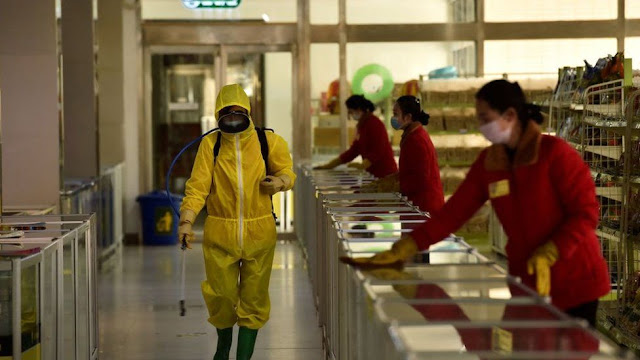As a wave of Covid cases sweeps the country, North Korean leader Kim Jong-un has chastised health authorities and ordered the army to assist in the distribution of drugs. According to official media, more than a million people have been affected by a "fever" in Pyongyang.
There have been 50 deaths, although it's unknown how many of those instances tested positive for Covid. Because North Korea has limited testing capabilities, only a few examples have been confirmed. Because of a lack of vaccines and a weak healthcare system, North Koreans are particularly vulnerable to the virus. In the remote country, there is a countrywide lockdown.
Mr Kim, according to state media, called an emergency politburo meeting over the weekend, accusing authorities of botching the allocation of national pharmaceutical stocks. He ordered the army's medical corps to intervene with "strong troops" to "quickly stabilize the supply of medications in Pyongyang City."
Although specialists believe the virus has been spreading for some years, the nation revealed its first confirmed Covid cases last week. Mr. Kim has implemented "maximum emergency" virus measures, which include workplace lockdowns and gathering limitations.
Last year, the international world gave millions of AstraZeneca and Chinese-made vaccines to North Korea, but Pyongyang claimed control of Covid by locking its borders early in January 2020.
- Why does North Korea lack sufficient food?
- In North Korea, how will the epidemic manifest itself?
- How scary is North Korea's situation?
South Korea and China, who have also seen breakouts, share land borders with North Korea. China is now battling an Omicron wave with lockdowns in its major cities. If the North requests it, South Korea has pledged to provide unlimited supplies, including vaccine doses, health staff, and medical equipment.
Mr Kim described the quickly expanding Covid-19 outbreak as a "big calamity" on Saturday. "The spread of the cancerous epidemic is [the biggest] crisis to strike our country since its inception," he said, according to the official KCNA news agency.
In addition to the immediate health implications, concerns have been expressed about North Korea's food production. It went through a devastating famine in the 1990s, and the World Food Programme believes that 11 million of the country's 25 million inhabitants are malnourished now.
Analysts believe that if agricultural laborers are unable to care to their crops, the consequences would be disastrous.

0 Comments
Post a Comment